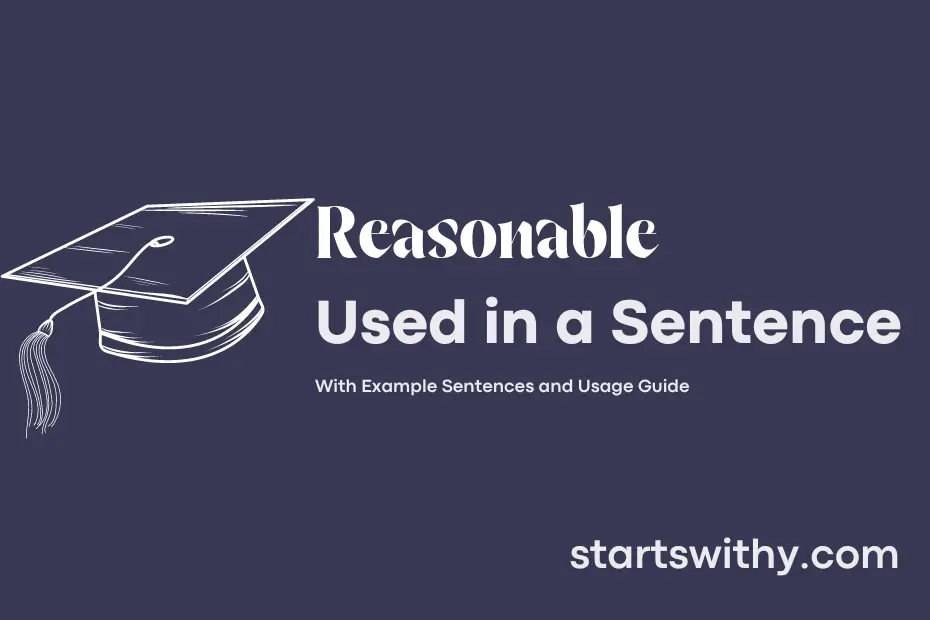Have you ever wondered how to use the word “reasonable” in a sentence? “Reasonable” is an adjective that describes something fair, sensible, or logical in a given situation.
When you use “reasonable” in a sentence, you are indicating that something is within the bounds of what is considered sensible or fair, based on the circumstances at hand.
7 Examples Of Reasonable Used In a Sentence For Kids
- A reasonable amount of toys is important to share with friends.
- It’s reasonable to ask for help when you need it.
- Eating a reasonable amount of fruits and vegetables is good for your health.
- It’s reasonable to take turns when playing games with friends.
- Being kind to others is always a reasonable thing to do.
- Make sure to use a reasonable amount of crayons when drawing.
- It’s reasonable to listen to your teacher during class.
14 Sentences with Reasonable Examples
- It is reasonable to allocate a specific budget for groceries and stick to it each month.
- Setting a reasonable study schedule can help you manage your time effectively and reduce stress during exams.
- It is always reasonable to seek help from professors or tutors if you are struggling with a particular subject.
- Planning ahead and booking train tickets in advance can save you money as the prices are usually more reasonable.
- Opting for a reasonable accommodation option closer to campus can save you time and money on transportation.
- Taking breaks during long study sessions is a reasonable way to prevent burnout and enhance productivity.
- Investing in a good quality laptop or tablet is a reasonable choice for college students as it will facilitate online classes and assignments.
- Sharing textbooks with classmates is a reasonable way to save money and resources during your college years.
- Utilizing student discounts whenever possible is a reasonable approach to managing your expenses as a college student.
- It is reasonable to attend career fairs and networking events to explore job opportunities and build connections for the future.
- Cooking meals at home rather than eating out can be a more reasonable option for college students looking to save money.
- Being proactive and starting assignments early is a reasonable strategy to avoid last-minute stress and ensure quality work.
- Choosing a reasonable number of extracurricular activities will allow you to balance academics and personal development effectively.
- Creating a reasonable monthly budget can help you track your expenses and ensure that you are not overspending.
How To Use Reasonable in Sentences?
To effectively use Reasonable in a sentence, beginners should follow these simple steps:
First, identify a situation or statement where you want to express that something is fair, just, or moderate. This could involve comparing prices, evaluating arguments, or determining appropriate actions.
Next, place the word Reasonable in the correct position in your sentence. It typically comes before a noun or adjective to modify or describe it. For example, “The store offered reasonable prices for their products” or “She made a reasonable argument in the debate.”
Make sure that the context of your sentence supports the use of Reasonable. It should align with the meaning of being sensible, rational, or within limits. Avoid using it in a way that contradicts this concept.
Additionally, consider the tone and formality of your sentence. Reasonable is a versatile word that can be used in both casual and formal settings. Just ensure it fits the overall style and intention of your message.
Finally, practice using Reasonable in various sentences to become more comfortable with its usage. Reading examples and incorporating the word into your writing or conversations will help solidify your understanding and make it easier to incorporate naturally.
By following these steps, beginners can confidently use Reasonable in a sentence to convey a sense of fairness, logic, or moderation.
Conclusion
In conclusion, writing sentences with reasonable structure and clarity is essential for effective communication. When constructing sentences, it is important to ensure that they are logical, coherent, and easy for the reader to follow. Sentences that are concise, properly punctuated, and free of grammatical errors contribute to a clear and impactful message. By using language accurately and thoughtfully, writers can convey their ideas with precision and engage their audience effectively.
Furthermore, sentences with reasonable length and complexity are more likely to hold the reader’s attention and convey the intended meaning without confusion. Keeping sentences clear and concise allows for better comprehension and engagement, ultimately enhancing the overall quality of written communication. By prioritizing reasonableness in sentence construction, writers can create content that is both engaging and easy to understand for their audience.



